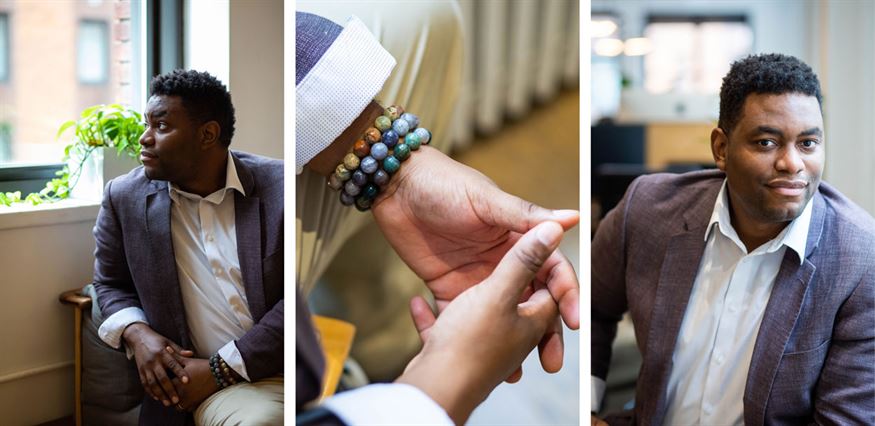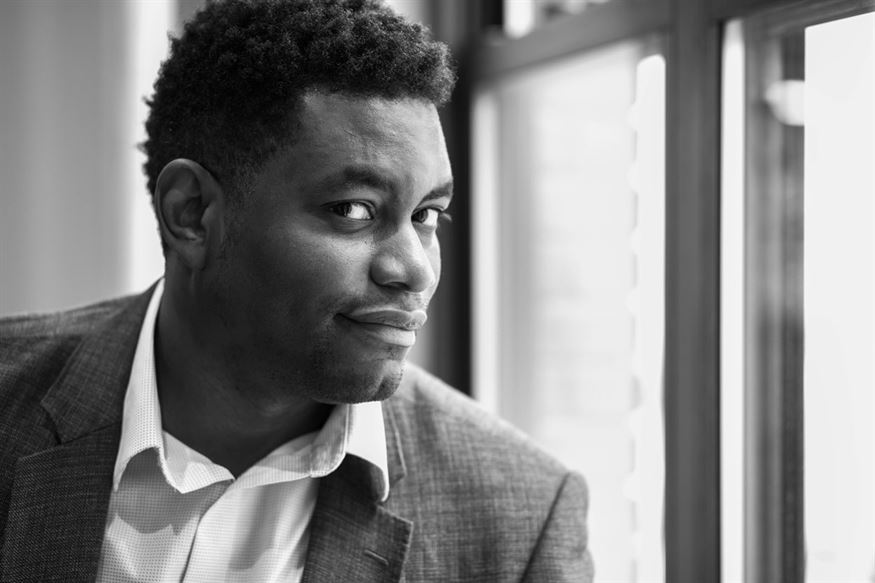James Johnson-Piett is a recent member of our luxury coworking space community. With a small team by his side, this socially-conscious CEO is bringing resources to builders and innovators in underserved segments of society. Here’s his story:
James Johnson-Piett is a renaissance man in many senses. His career has meandered from municipal bond underwriter to elementary school math teacher, to indie screenwriter and film editor, tarot card reader, and program manager for a revolving loan fund investing in food retail. He’s also touted a bunch of side hustles to keep him busy along the way.
But James doesn’t just like trying on new hats—he’s always been focused on inspiring change wherever he lands. The throughline of his experience is a passion—and a knack—for helping out businesses and organizations in low-income or marginalized communities. At every turn, he recognized problems aching to be solved and talent waiting to be ignited. The missing ingredient was always capital. That’s why in 2008 he founded Urbane Development, which designs strategies to bring wealth and resources into underserved communities. Urbane has worked with over 1,000 small businesses and raised more than 55 million dollars to help these communities thrive. They also consult on projects and co-develop mixed-use real estate here in NYC.
What James really dreams about is a kind of renaissance for these communities that have been so overlooked and undersupported. We talked to James about how he tackles this lofty challenge, what advice he’d give to aspiring change-makers, some of his most memorable moments, and the perks of working in a coworking space in NYC.
How did the idea for Urbane evolve? Can you trace it back to a particular moment?
The real moment was one of extreme privilege: I was sitting on a hill in Cinque Terre, Italy, overlooking the Mediterranean and this feeling came over me—this deep desire that everyone I worked with, from clients to the communities they serve, should be able to take a deep breath and listen to ocean waves lapping against rocky cliffs. Freedom and peace of mind should be within reach for everyone.
I believed then (and still do) that economic mobility is something marginalized communities can easily achieve with the proper investment in talent and risk capital. It’s what we take for granted in private equity or VC or even middle-market M&A. Tons of industries have ignored minority, women, LGBTQ+, and other underrepresented groups on the investment spectrum.
It was there, in that moment of gratitude and clarity, that I decided to build a company to attract those resources for the people who most need them. And that was Urbane.
What is your day-to-day like in your role? What are some of your top challenges?
We’re a small team at Urbane with just eight full-time and two part-time employees, so on some levels, the moniker of CEO is a bit of a misnomer. I’m very involved in the field: Last week, I was with five of my colleagues facilitating an interactive workshop on technology sector job opportunities for public housing residents in Brooklyn. Next week, I’m heading to Detroit for a follow up to our “Bodega Boot Camp,” a short course for start-up and growth retailers in the grocery industry looking for a competitive edge in low/moderate-income communities. Most of my days are spent in business development meetings and nights are focused on strategy and long-term planning. We also own the six-day-a-week Caton Market in Flatbush, Brooklyn, so all of the opportunities and struggles of a retail space are an everyday consideration for me and my staff.
Our challenges are typical for any small business: Cash flow, talent acquisition and cultivation, building company culture, finding time to do everything that needs to be done. One thing that’s especially tricky is finding the right balance of clientele. As a social enterprise, profit isn’t our sole motivation. We have clients that could never pay market rate fees—nor would we want them to. So our goal is to figure out how to find extremely profitable projects that are still mission-aligned to help subsidize the not-as-profitable ones that add a ton of value to our clients, the communities we want to empower, and the field at large.
 Photographed in Blender’s luxury coworking space, James Johnson-Piett Johson, Founder and CEO of Urbane Development
Photographed in Blender’s luxury coworking space, James Johnson-Piett Johson, Founder and CEO of Urbane Development
What do you see as some of the top issues facing New York City neighborhoods, in particular?
Affordability is a massive problem, and not just from a social equity perspective. It’s a huge economic and cultural issue. We co-authored a study on the NYC nightlife economy for the City of New York. Nightlife is a big economic driver for the city, but you can see how the lack of affordability for owner-operators, for performers, and even for those who speculate in the market, is a huge competitive disadvantage compared to places like L.A., Miami, Philly, or Detroit. If the creative class can’t find affordable housing, affordable production space, or affordable performance space, they’ll leave. If the innovators who can afford to live here only represent a tiny percentage of the population, you kill what makes NYC special: its incredible diversity.
The NYC transportation infrastructure also has to improve. If you can’t move through the city, you can’t work, play, or live to the highest and fullest extent. It’s like having clogged arteries, particularly in the outer boroughs, which disproportionately impacts lower-income New Yorkers and New Yorkers of color.
What’s one of the most rewarding projects you’ve been involved in since founding Urbane?
One of our most high-profile projects is the Flatbush Caton Market redevelopment, which embodies what the company is all about: Strong data collection and analytics that inform decision-making, as well as investment in small businesses owned by or serving emerging but marginalized communities. It’s also created a new construction project that will result in both cultural preservation and wealth-generation for the Caribbean community in Flatbush.
Another project that not too many folks know about was a partnership with a Portuguese sausage maker in Fall River, Massachusetts. We helped him create a chicken chorizo product to attract younger consumers who appreciate the flavors of their traditional cuisine but are more health-conscious.
Do you have a favorite New York City moment?
For my 30th birthday, I gathered every single person from every walk of my life to take over a Korean BBQ joint in Koreatown. Then we jumped on the subway and danced off the meat sweats at Bembe in Williamsburg until 5 am (this was 10 years ago, that place still has a vibe!). We watched the sun come up under the bridge, drinking leftover Guarana from the club. It was a menagerie of cultures and energy merging at a time and in a space that could never exist again. Definitely a NYC memoir-moment for me.

How do you measure success, both in your work and in your personal life?
Professionally, the biggest success has been watching been the people who have done great things at Urbane do even better things once they leave. I think we’re a beautiful training ground for urbanists who want to make communities better and leverage market-drivers to make that happen. As a company, we pride ourselves on truly solving problems—whether it’s through strategy, or, in many cases, by cleaning up a mess. We want to leave our clients and the communities we work with something tangible and generative.
Personal success is about making my wife and loved ones happy and enriched in all the ways I can. It’s also when I find the time to indulge my own interests without getting totally subsumed in work. My recent move back to Philly (where I split my time) was spurred by a desire for a little more space—and from there I developed a gardening obsession. I have a baby Japanese Maple that’s thriving in the back yard…although I didn’t anticipate the battle with the Philly squirrels!
What advice would you give an aspiring entrepreneur, based on your own experience?
-
-
-
-
- Figure out your plan to cultivate partnerships and talent—the mythic entrepreneur on an island is not actually a thing.
- Understand that Plan B and C will be where you actually start; Your initial vision will ultimately need to pivot. Be open to change.
- Make sure you find a support network—for emergency cash, for mentorship and sage advice, or for an ear when you need to scream.
-
-
-
What drew you to the Blender coworking space?
Before Blender, we were headquartered in a loft in Tribeca. While we eventually grew out of that space, we still wanted that vibrant, New York energy around us. We were looking for a premium private office space in Manhattan that was aesthetically interesting with ample area to collaborate and congregate. We also wanted to work alongside a more mature, professional set of businesspeople. Blender checked all those boxes…plus you have really great Aesop soaps and chill bathroom music! Nice touches all around. The management team is also super professional and very responsive to needs, it’s been a pleasure working with them.